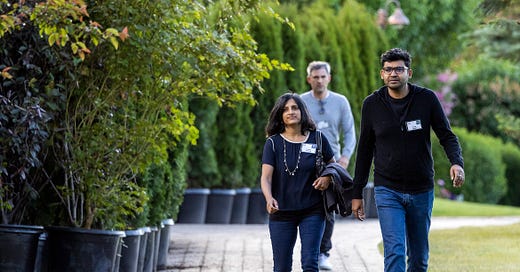Biotech's AI Moment Brings New Tools for Drug Discovery
Big name investors are writing huge checks into new biotech companies, but many of the breakthroughs remain unproven
Biotech has long been a specialist niche in the venture world. But now the rise of generative AI and the development of biology-specific foundation models has led parts of the sector to break through, luring large, multi-focus venture players into the space and promising fresh advances in drug discovery.
Founders and investors say these specialized AI models will dramatically accelerate the painstaking, trial-and-error work that’s at the heart of pharmaceutical R&D: finding new compounds that can modify human cells, such as proteins that might be involved in an autoimmune disease, or malformed cells that are causing cancer. The bio-models can be used to identify a range of new proteins, molecules, or even sequences in DNA and RNA that might prove useful for treating diseases.
It’s not a new idea: Atomwise and Exscientia, two of the best-known names in drug discovery, have been developing proprietary machine learning techniques for over a decade, which they’re now further enhancing with generative AI. Another established biotech firm, Recursion Pharmaceuticals, recently developed a generative AI chat interface that can query all its bio foundation models simultaneously.
The power of the new generative AI models, though, is opening up the field, with several buzzy AI-biotech rounds closing in recent months. Meta’s former biotech research team, which was laid off last year, in June launched its own biology foundation model startup, EvolutionaryScale, with $142 million in funding from Nat Friedman, Daniel Gross, and Lux Capital’s Josh Wolfe.
In April, former Stanford president Marc Tessier-Lavigne’s drug discovery startup Xaira Therapeutics emerged from stealth with over $1 billion in capital after being incubated by ARCH Venture Partners and Foresite Labs. Megafunds including Sequoia, NEA, Lightspeed Venture Partners, and Menlo Ventures were among the investors.
And another biology-model startup, Cradle, is raising a new round of funding, according to two people with knowledge of the deal.
We’ve compiled a list of what VCs in the field say are the top AI-biotech startups and investors building now. Scroll down to see the full list.
Some of the current excitement stems from Google DeepMind’s May release of the AlphaFold 3 protein model, which General Catalyst partner Elena Viboch called a “ChatGPT moment” for biotech.
The original AlphaFold, launched in 2021, served as a tool for biotech researchers to search for proteins that could target specific biological functions. AlphaFold 3 lets researchers predict the structures of more complicated proteins and combined protein systems, which makes searching for therapies much more efficient. It’s currently only available for non-commercial use, but founders can use the older versions of AlphaFold for their products.
Though Meta backed away from its AI-biotech efforts, other big tech companies are forging ahead: Microsoft, OpenAI, and Salesforce have developed biology foundation models as part of their AI research labs.
Pharmaceutical companies and public biotech firms are also developing their own bio-first models. Ginkgo Bioworks announced a partnership with Google Cloud to develop its own foundation models in September last year, and more than 100 companies are currently partnering with NVIDIA to access their “BioNeMo” platform, which hosts several bio foundation models, including those from startups like Recursion.
Biotech startup investors we spoke with pointed to London-based CHARM Therapeutics as a particularly promising play. The company has developed an algorithm that can predict how different proteins will interact with each other in the body, and hopes to single out specific proteins that can reverse or treat previously untreatable cancers and rare diseases. Led by CEO Laksh Aithani along with academic David Baker and formerly DeepMind veteran Sergey Bartunov, CHARM has raised $70 million to date from investors, including General Catalyst, Khosla Ventures, and OrbiMed.
Another firm VCs singled out was Atomic AI. It’s developing an AI-driven 3D engine to predict and design patterns in a group of RNA molecules, which can then be fine-tuned for specific purposes. (RNA work was central to the COVID-19 vaccine breakthroughs.) It scored $35 million in Series A funding last year and counts Playground Global, Nat Friedman, and Not Boring’s Packy McCormick among its investors.
The overarching pitch for these early-stage startups is that their models are more efficient and cost-effective compared to traditional pharma R&D. Pear VC’s Eddie Eltoukhy notes that a lot of that work is still done manually, so automating and fine-tuning with AI can dramatically accelerate the movement of a drug from the lab to clinical trials.
Researchers can prompt the bio-models to generate hypothetical compounds that treat disease according to the specified parameters. After the model spits out potential compounds, researchers can test them under different conditions through virtual simulations, or “in silico,” as they put it. The best targets can move on to the lab testing stage, or “in vivo” testing. These compounds can range from small molecules to large proteins or even synthetic antibodies.
Getting drugs to market is still a long road. While some startups have seen promising early results in generating protein structures and potential compounds, widely distributed therapeutics made with AI have years of testing and trials ahead.







